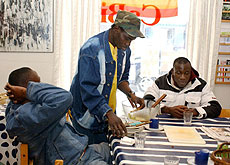
Court rules in favour of failed asylum seekers

The Federal Court has ruled that rejected asylum seekers have a right to emergency aid, a day after the Senate voted to tighten the asylum law.
Friday’s ruling came as the United Nations refugee agency said it “deeply regrets” moves towards stricter legislation against asylum seekers in Switzerland.
The Federal Court said on Friday that asylum seekers whose requests had been ruled inadmissible and who refused to cooperate with the authorities were still eligible for emergency assistance.
The country’s highest court upheld an appeal by a rejected asylum seeker from Africa whose aid had been withdrawn by a local tribunal in Solothurn in western Switzerland.
The judges said that nobody should die of hunger in Switzerland and that the Solothurn court’s decision to stop paying emergency aid of SFr21 ($18) a day was unconstitutional.
They reminded the Solothurn authorities that Article 12 of the Swiss constitution stipulated the right to aid when in need.
There has been a ban on welfare payments for failed asylum seekers since April last year. But they, and those awaiting deportation, are still allowed emergency – basic – aid.
The court’s ruling was welcomed by refugee organisations and churches, while Justice Minister Christoph Blocher downplayed the impact of the ruling.
He called on parliament to amend the constitution and supersede the court decision.
Tougher law
The ruling comes amid moves to tighten Switzerland’s asylum law. On Thursday the Senate adopted a proposal that would allow the Swiss authorities to deny emergency aid to those who refuse to leave the country.
It also voted to extend the ban on welfare benefits to all failed asylum seekers, including those going through the appeals process.
Blocher said that aim of the legislation was to make Switzerland less attractive to rejected asylum seekers.
Under the bill, applicants who were unable to prove their identity would not be considered for asylum.
But an application would be considered in cases where there were reasonable grounds to believe that a person faced persecution at home.
Criticism
The UN’s refugee agency has sharply criticised the law.
“We’re very disappointed. This is now one of the harshest pieces of legislation in Europe,” said UNHCR spokesman Rupert Colville.
“We had told the Swiss we had very strong reservations about it, but they don’t seem to have taken them into account.”
“Asylum laws can always be improved, but we felt this legislation was getting harsher and harsher as it progressed through the drafting process,” he told swissinfo.
The UNHCR pointed out that the number of asylum seekers arriving in Switzerland had already fallen to its lowest level since 1987.
Official figures state that asylum requests dropped by 32 per cent in 2004, compared with 2003.
Objections
The UNHCR said it had several objections to the law, which has to return to the House of Representatives for a second vote.
The UN agency was especially critical of the tougher measure against asylum seekers travelling without documents.
It said many applicants were not able to obtain passports or identity papers before fleeing their homes.
Colville also condemned a decision to allow the Swiss authorities to pass on data of rejected asylum seekers to their countries of origin.
“Many refugees are only recognised in Europe after an appeal,” he said. “But if the Swiss share data about a person with their country of origin before the appeal process is over, they could be putting refugees and their relatives at risk.”
swissinfo with agencies
Emergency aid covers the provision of shelter, food, toiletries as well as health and dental services.
A payment of SFr21 ($18) generally covers these services.
The canton of Solothurn had attempted to stop paying this aid to rejected asylum seekers, but was overruled by the Federal Court.
The canton has 16 similar cases pending.

In compliance with the JTI standards
More: SWI swissinfo.ch certified by the Journalism Trust Initiative
















![The four-metre-long painting "Sonntag der Bergbauern" [Sunday of the Mountain Farmers, 1923-24/26] had to be removed by a crane from the German Chancellery in Berlin for the exhibition in Bern.](https://www.swissinfo.ch/content/wp-content/uploads/sites/13/2025/12/01_Pressebild_KirchnerxKirchner.jpg?ver=a45b19f3)











You can find an overview of ongoing debates with our journalists here . Please join us!
If you want to start a conversation about a topic raised in this article or want to report factual errors, email us at english@swissinfo.ch.